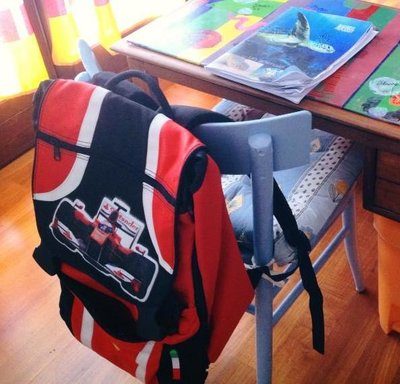 One of the most common complaints you will hear from parents today is that the world just doesn’t seem to be as safe as it was when they were children. Every day you hear more and more about child predators, bullying in the schools, and children being left altogether too often to their own devices while parents are off at work or at social events.
One of the most common complaints you will hear from parents today is that the world just doesn’t seem to be as safe as it was when they were children. Every day you hear more and more about child predators, bullying in the schools, and children being left altogether too often to their own devices while parents are off at work or at social events.
If you are a concerned parent looking towards a safe and healthy future for your child, you should understand right from the very beginning that safety begins at home. Sometimes it’s not exactly what you teach your children, but rather things you could be doing to protect them whether you are there or not. In other words, keeping your children safe goes deeper than meets the eye.
Beyond Those Necessary Basic Safety Rules
You may be thinking that this is obvious. Setting up safety rules for your home is something every parent does, isn’t it? Actually, this is not always the case. There are obvious things every parent learns to communicate to their children from the earliest years such as not to play with fire or talk to strangers, but those are the rules everyone lives with. Is that enough to keep your child safe as they grow into teens and young adults?
Let’s talk about fire, for just a moment. You’ve taught your child not to play with matches and to avoid open flames so that they aren’t burned by touching. What about families living in fire zones? Have you taught your children how to evacuate the home quickly and safely in the event of a wildfire? Do they know the numbers to call in the event of an evacuation if there is no one to safely transport them out of the area?
Do they know where their emergency bag is packed and ready to grab in the event they need to leave immediately? These are all things which every older child should be taught to keep them safe if you are not at home when the evacuation orders are issued.
The Responsibility for Staying Safe Grows with the Child
A responsible parent understands that they cannot always take responsibility for a child’s actions. In essence, responsibility grows with the child. Young children need to be guided so that they begin to learn the difference between safe and unsafe behaviors. They learn not to play with fire, as mentioned above, and to never talk to or give information to strangers.
As they advance in years, most children will test your limits. The one thing many parents are ‘guilty of’ is not letting their children bear the consequences of unacceptable behaviors.Although you may not have considered this, these kinds of oversights somehow work their way into safety issues. Little lapses on their part can often lead to larger issues until they have no boundaries and are suddenly in an unsafe situation simply because they didn’t bear the consequences for minor infractions such staying out after curfew.
At some point, parents get ‘used to’ this behavior and that one time a child is actually in an unsafe environment, the parent would be none the wiser thinking their child was just being irresponsible again. While being overly strict isn’t healthy, there is something to be said about enforcing family safety rules from early on and monitoring their behavior as they advance through teenage years.
Safety Concerns You – As a Parent – Should Be Addressing
No one wants to face the inevitability that their time on this earth is limited. Not everyone dies of old age and that is simply a fact of life. Sometimes serious illnesses strike, and other times accidents take the lives of our loved ones literally in the blink of an eye. Have you ever stopped to consider what would happen to your children if you should pass while they were still dependents?
It is difficult enough for a two-parent household, but in a single-parent family it is even more unimaginable. One thing you should consider is that there is such a thing as term life insurance which is quite inexpensive for young, healthy people and this could be the difference between a financially safe future for your children and one of poverty.
As your children become older teens, explain to them the term life insurance definition and that this is a type of insurance that will pay a one time settlement that would ensure they have the funds to pay off existing mortgages and other payments so that any adult caring for them wouldn’t bear that responsibility. Some parents leave a will stating that the money is to be used for college funds or any other purposes they deem necessary for the ongoing safety and welfare of their dependent children.
Learning Comes in Stages
While you wouldn’t want to address these kinds of concerns with younger children, the thing to remember is that developmental learning happens in stages. By the time you have older teens in the house preparing for their own futures, it’s time to start teaching them what you’ve done to keep them safe throughout the years.
There is no reason to be like so many parents lamenting the unsafe world they now live in when you could be preparing your children step-by-step as they grow. From infancy, the teaching begins with such things as how to avoid getting cut or burned and why they shouldn’t run into the street or talk to strangers.
As they grow and begin to learn about online safety, you can begin teaching them about how easy it is for predators to locate them if they aren’t careful. Finally, at some point it’s time to have ‘the talk’ with your kids about such things as safe sex and what they can do to work towards a safe future for themselves as they progress into adulthood.
Your Key Takeaway
Keeping your children safe goes deeper than the safety rules you’ll read on any parenting website. It’s a progressive learning experience in stages as they develop. Your role as a parent is to guide them on their journey to adulthood. This goes far beyond the ABCs of safety and it’s what many parents fail to see. Don’t be among their number. Keeping them safe is an everyday affair. Never lose sight of that.
Brought to you by our friend, Carol.










